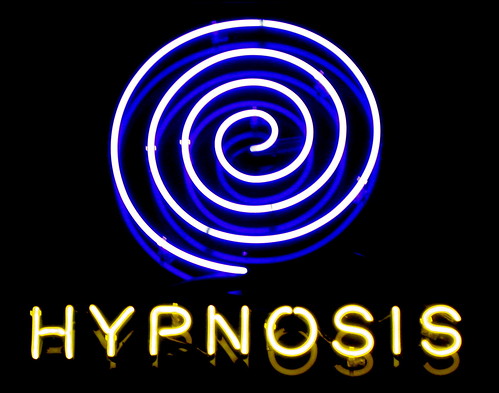Despite long standing associations with mysticism and stage hypnotism, hypnosis has also been used for medical and scientific purposes. For well over a century, hypnosis has been used to treat a wide range of conditions. These have included pain, irritable bowel syndrome, post-traumatic stress, phobias and eating disorders.
More recently, hypnosis has began to attract notice from cognitive neuroscientists. They have become interested in understanding hypnosis, and using it to simulate unusual states of consciousness in the lab.
Hypnotic suggestion allows one to harness the effect of attention in the brain. This allows the enhancement, and even production, of a wide range of experiences. In many people, hypnotic suggestion can produce compelling changes in perception and cognition, including temporary paralysis, anaesthesia and blindness.
Hypnosis produces a highly focused state which allows “suggestions” – simple statements communicating changes in a person’s experience or behaviour – to take place, such as “your leg is becoming so stiff that you cannot move it”. It has also been long recognised that suggestions can be effective without a hypnotic induction procedure, but this is rare, only occuring in highly suggestible individuals.
In the lab
The ability to experimentally manipulate subjective awareness in the laboratory could have major potential, as I describe in the latest issue of Nature Neuroscience Review.Current interest in the area can be divided into two types of research. Some are looking to acquire a better understanding of the nature of hypnosis. Others are interested in using hypnotic suggestion to investigate certain aspects of normal and abnormal psychological functioning.
Employing a range of brain imaging technologies, both approaches are using hypnosis to explore the nature of consciousness. They are also gaining insight into the brain mechanisms underlying visual perception, pain, and the putative origins of some clinical symptoms. These include medically unexplained paralysis as seen in hysteria, hallucinations, delusions and alterations in control over thought and actions in schizophrenia.
Understandably, scepticism remains regarding the credibility of reports involving hypnotic suggestion. Participants, however, typically describe the perceptual and behavioural changes experienced as “real”, and beyond voluntary control.
Recent experimental studies support the case for hypnosis being a physiologically credible experience. This is particularly seen where suggestions disrupt well-established automatic, unconscious processes, such as reading.
The findings
There is a now a growing literature which shows how hypnotic suggestion can be used to create temporary functional changes in a range of ways.Hypnosis has also been used instrumentally to develop and test models for a number of specific psycho-pathologies including delusions, auditory hallucinations, functional paralysis and obsessive-compulsive disorder.
It can also be used to suggest subjective experiences that are similar to symptoms observed in neurological and psychiatric disturbances. These have included chronic pain conditions, and disorders of volition and motor control.
Hypnotic suggestions have been used to induce “synaesthetic” experiences – where one sense triggers the involuntary use of another. In colour-number synaesthesia, people experience colours associated with specific numbers. The reliable effects reported in naturally occurring synaesthesia are commonly considered to be outside a subject’s control. However, one study showed that hypnotic suggestion could be effective in abolishing the apparently automatic experience of synaesthesia.
There is clearly great future potential in this growing field. In addition to scientific advances, the ability to produce neurological symptoms of “virtual patients” in normal volunteers also provides a potential training value. Practitioners could have the possibility of experiencing these symptoms for themselves: through hypnotic suggestion.
Over the past 25 years Peter Halligan has received funding from MRC and other UK research councils and charities, although none specifically for research on hypnosis.
This article was originally published at The Conversation. Read the original article.
Recommended Resources:
Check out Mind Motivator Hypnosis Audio and have access to more of your brain’s motivational drive and inspirational capacity


No comments:
Post a Comment